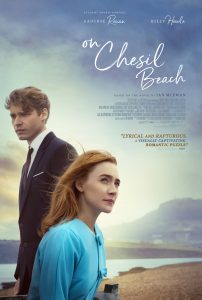
(Sight & Sound, BFI)
“Say something,” begs newlywed Florence (Saorise Ronan), her bright blue irises making her doll-like as she lies beneath her husband on their marriage bed. She’s asking for any kind of communication with this man – this boy, really – whom she loves, so long that it’s not sexual intercourse. The tragedy is that she’s totally unable to explain this to him.
But her plea has an inadvertent extra significance in On Chesil Beach, the first film by vaunted theatre director Dominic Cooke. The source novella by Ian McEwan, published in 2007, has little direct dialogue, so the film must devise reams of it for the actors, paraphrased from the text or created from whole cloth.
The book rested on the unspoken, incommunicable tensions between its central couple. It’s 1962. Florence and her new husband Edward (Billy Howle) are in a Dorset hotel on their wedding “night” (though Florence notes that it won’t be dark for hours). While the book was split evenly between them, Florence dominates the film version, in another strong vehicle for Ronan. She’s a woman in an invisible trap, to which Edward is insensitive.
Florence longs to be with Edward, to be kind to him – it’s just the sex that appals her. As Edward fumblingly tries to undress the two of them, bringing the fatal moment ever nearer, Florence’s petrified, pinched and cowed expressions scream out to the viewer, even as Edward stays oblivious.
This narrative is broken up by flashbacks with mixed success. Their thrust is to counterpoint the wedding’s disastrous first hours with the recent, now unreachable past. We see Florence and Edward’s joyful courtship, after they first locked gazes at a CND rally. Both of them won Firsts at university, which fills Edward – who looks endearingly childish through the film – with the confidence to date a girl above his station.
Instead of actual sex, Florence shows him “the greatest octave leap there ever was”, as they dance to her beloved classical music, on state-of-the-art home audio. For his part, Edward worships Florence but can also tease her about her urbanite’s ignorance of birdsong. In one languid scene, the couple lie securely together on a riverbank, untouched by the fears that are already erupting in the framing hotel scene.
These moments shine, but some of the flashbacks are clumsy, cued by lumpy dialogue and marred by dramatic crimes. We’re asked to believe, for example, that Edward, in the throes of pre-coital desire on the marriage bed, has the patience to tell a story about a street brawl. A different flashback, showing Florence bonding with Edward’s brain-injured mother (Anne-Marie Duff) is touching and treacly. Invented for the film, it will have McEwan purists gritting their teeth. So will the tweaked ending, though the film keeps many details letter-perfect.
The book did suggest an answer to why Florence is terrified of sex, though it was floated as a possibility, not a pat solution. In the film, it becomes the definite reason for her fear, one which any twenty-first century viewer would think of. More broadly, On Chesil Beach blames the couple’s plight on outdated social mores, as Edward and Florence meet tragically too soon for the sexual revolution. Still, the film is more hopeful than the book that time can heal. Perhaps Florence, who’d now be in her seventies, might take sad solace from Lady Bird, in which Ronan’s title heroine found that first sex – especially for a girl – can still be mortifying in the 2010s.